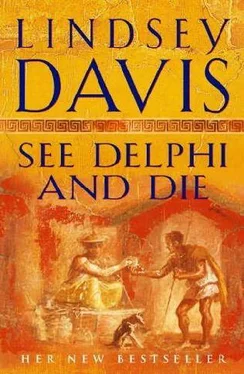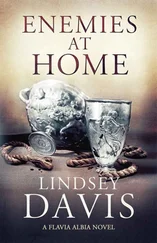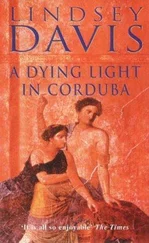Lindsey Davis - See Delphi And Die
Здесь есть возможность читать онлайн «Lindsey Davis - See Delphi And Die» весь текст электронной книги совершенно бесплатно (целиком полную версию без сокращений). В некоторых случаях можно слушать аудио, скачать через торрент в формате fb2 и присутствует краткое содержание. Жанр: Исторический детектив, на английском языке. Описание произведения, (предисловие) а так же отзывы посетителей доступны на портале библиотеки ЛибКат.
- Название:See Delphi And Die
- Автор:
- Жанр:
- Год:неизвестен
- ISBN:нет данных
- Рейтинг книги:4 / 5. Голосов: 1
-
Избранное:Добавить в избранное
- Отзывы:
-
Ваша оценка:
- 80
- 1
- 2
- 3
- 4
- 5
See Delphi And Die: краткое содержание, описание и аннотация
Предлагаем к чтению аннотацию, описание, краткое содержание или предисловие (зависит от того, что написал сам автор книги «See Delphi And Die»). Если вы не нашли необходимую информацию о книге — напишите в комментариях, мы постараемся отыскать её.
See Delphi And Die — читать онлайн бесплатно полную книгу (весь текст) целиком
Ниже представлен текст книги, разбитый по страницам. Система сохранения места последней прочитанной страницы, позволяет с удобством читать онлайн бесплатно книгу «See Delphi And Die», без необходимости каждый раз заново искать на чём Вы остановились. Поставьте закладку, и сможете в любой момент перейти на страницу, на которой закончили чтение.
Интервал:
Закладка:
Next task was to familiarise ourselves with the sanctuary. We knew it would be a dramatic experience. Even after Olympia, with its massed temples and treasuries and its hundreds of statues of athletes, we were awestruck by the plethora of monuments. Nothing prepares the traveller for Delphi. In its heyday it must have been staggering, and it remained spectacular. We were seeing the sanctum when it was sadly in decline. That was due to Rome. Not only had bully boy Sulla stolen all the precious metal donations to finance his siege of Athens, but things had then deteriorated until the final indignity, ten years ago, when Nero attended the Pythian Games and carried off five hundred of the best statues. Nero loved Greece; he loved it so much, he stole as much as possible.
More importantly, Roman rule had meant the loss of Delphi's political power. Cities and states no longer came here to consult on matters of policy. Without their gratitude for good advice, no more treasure would be deposited.
As you would expect, the sanctuary of Pythian Apollo was surrounded by a wall. Parts were made from enormous polygonal blocks which seemed to be the handiwork of giants. There were several gates, the purpose of which in my opinion was to funnel visitors into the hands of money-grubbing souvenir-sellers and guides.
We had decided not to use a site guide. The clamorous guides decided otherwise. We were mobbed as soon as we stepped through the main gate on to the Sacred Way. Despite us shaking our heads and striding ahead, one man attached himself to us. He was a round-faced wraith with receding hair, so short that as we walked beside him we felt like over-healthy demigods. He proceeded with his patter whether we wanted it or not. Around us were other groups of pilgrims and tourists, all looking bemused by the same torrent of stories, recitation of inscriptions, names of battles, and lists of donated weaponry and gold plate. In the past, every city in the Greek world had jostled for attention by making ostentatious gifts, seeking the favour of the gods and the envy of other cities with varying degrees of taste and extravagance.
The monuments nearest the gate score highest. Later, visitors are far too jaded to remember much. Our guide talked us past the bronze bull dedicated by Corcyra and the nine bronze statues of Arcadian gods, heroes, and heroines. I chortled at the outrageous belligerence of a Spartan commemoration of a naval victory over Athens, which boasted no fewer than thirty-seven statues of gods, generals, and admirals (each one meticulously named by our guide;) Helena preferred a more dignified and austere Athenian monument, which commemorated the battle of Marathon. These were just tasters. We could see the great Temple of Apollo above us, fronting a dramatic open air theatre, but at this rate we would take three days to reach it.
'Can I pay you to skip?' I asked the heedless guide.
'Can we pay him to shut up?' muttered Helena. He was now dragging us to a replica of the Trojan Horse, prior to Argive statues of the Seven against Thebes – and then another set of Argive gifts: the seven sons of the Seven against Thebes. We looked at each other in horror. Luckily the seven sons had managed to destroy Thebes, which spared us further generations. Even so, the magnanimous Argives kept going and managed to install ten more statues, these set up to emphasise their kings' links with Hercules. Do not ask me what links; by then I was looking for a chance to wander off. Helena was gripping my hand tight, in case I abandoned her with the guide.
Soon we were in among treasuries. They were neat little roofed buildings, rather like tiny temples; instead of colonnades all round, their porches were generally adorned with only a couple of columns or caryatids – although the spectacular (rather too well draped) caryatids on the Treasury of Siphnos (where the hell is Siphnos?) sparkled with gemstones on their diadems and in their hair. The guide trotted out mentions of winged-victory acrotiria, sphinxes, continuous friezes, and sculptured Herculean metopes. The only way to cope with his bombardment of information was to copy the caryatids and affect a slight archaic smile (while wondering how long it was until lunch.)
By the time we reached the Council Chamber, my archaic smile was openly disfigured by bared teeth. Local government upsets me: old men making wrong decisions to protect their own trade interests.
At least we were getting somewhere: the spring once guarded by the rampaging dragon called the Python, which had been slain by the infant Apollo.
Apollo's mother Leto had stood on a rock and held him in her arms to shoot. This Leto must have been a liability. Helena and I had once been plagued by a neighbour who allowed her child to loose off toy arrows in the street; however, we hid our disapproval of feckless mothers and nodded wisely as the guide proclaimed Apollo's institution of a peaceable and spiritual regime.
Our guide droned on. 'Now we are standing before the most famous statue of antiquity – the Sphinx of Naxos, also called the Delphic Sphinx. It stands on an exquisite Ionian capital, in front of the polygonal wall. The column has forty-four flutings and six drums; it rises to a height of approximately forty feet, or forty-one and a half at the wing-tips. The Sphinx, who set very famous riddles, wears a dreamy, quizzical smile -' Helena had a quizzical expression too. She was inspecting its hairstyle. 'The most famous riddle was: what creature walks on four legs in the morning, two in the afternoon, and three at even tide?'
'Man! Crawls, walks, uses a stick.' I had had enough. Informers are notoriously gruff. Sometimes I try to overturn the stereotype; not today. I wished I had a stick myself, to beat the guide. 'Save it. Look here! I'll give you this -' The coin I offered was three times what he was worth. 'Now leave us alone, please.'
'You don't like my guiding?' The fellow pretended to be astonished.
Informers, who need to be unobtrusive, are followers of etiquette. When in shrines devoted to tolerance, I avoid getting into a fistfight. I stayed quiet and crisp. 'We want to commune with the gods in silence. So go back down the hill and kidnap someone else.'
'But you must have a guide!'
Cobnuts to etiquette. 'And you must have a kick up the backside if you don't go.'
He went.
Other tourists had overheard our rebellion with interest. Subgroups began huddling together; we could see them muttering, then squaring up to take action. Soon arguments broke out all around the ancient cave of the Python. The gods of immemorial earth and the deities of subterranean waters must have gurgled with mirth, as normally timid tourists stood up to their guides and dismissed them. Apollo, the arbiter of moderation, tickled the strings of his lyre and rejoiced.
I had no conscience about causing a rebellion. The bastard guides would be back tomorrow, boring new victims.
Helena and I gazed up at the Sphinx, hand in hand, glad of the chance to enjoy one famous statue undisturbed.
'She reminds me of you, my darling, in some ways. Beautiful, seemingly remote and mysterious – and clever, of course.'
'Older, though!' returned Helena cattily.
The time-honoured Sphinx showed no reaction, but assuming she was a woman of the world, I winked at her.
In our own time now, we moved on along the Sacred Way.
The narrow route wound upwards, its worn stones sometimes dangerous underfoot. Delphi could have used a Roman road-maintenance gang. Freed from our obligation to absorb every detail, we scurried past altars, columns, tripods, porticoes, pedestals, and victories, pausing only to admire the towering statue of Apollo himself beside the spring of Cassotis. At long last we reached the temple. We could hear guides listing the many previous versions of the building ('first woven laurel, then beeswax and bees-wings, then bronze, then porous stone in the Doric style…') They came up with more of these suspect details, but I stopped listening. (I'm all for myth – but you just try knocking up a garden gazebo from bees-wings when you have a free hour or two!) We took a quick circuit around, saw the east facade, with its scene of Apollo arriving in Delphi, and the west, with Dionysus and various maenads.
Читать дальшеИнтервал:
Закладка:
Похожие книги на «See Delphi And Die»
Представляем Вашему вниманию похожие книги на «See Delphi And Die» списком для выбора. Мы отобрали схожую по названию и смыслу литературу в надежде предоставить читателям больше вариантов отыскать новые, интересные, ещё непрочитанные произведения.
Обсуждение, отзывы о книге «See Delphi And Die» и просто собственные мнения читателей. Оставьте ваши комментарии, напишите, что Вы думаете о произведении, его смысле или главных героях. Укажите что конкретно понравилось, а что нет, и почему Вы так считаете.












